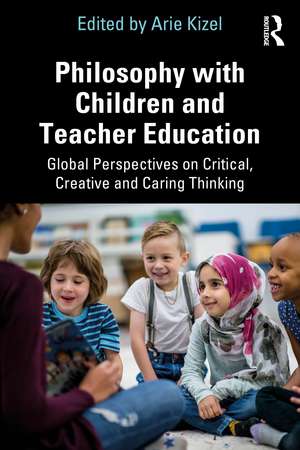Philosophy with Children and Teacher Education: Global Perspectives on Critical, Creative and Caring Thinking
Editat de Arie Kizelen Limba Engleză Paperback – 29 noi 2022
The book considers the deep and varied points of contact that exist between the pedagogical and philosophical principles of the philosophical community of inquiry and teacher education and training programs. It is designed to help improve education systems worldwide as they seek to shift their attention towards the student, student inter-relations, and student-other relations and foster independent high-order, critical, creative, and caring thinking within democratic, pluralistic societies. It proposes an innovative, creative way of approaching teacher education and training—a central subject in today’s educational world.
Offering diverse perspectives on integrating progressive educational philosophy and contemporary pedagogy, Philosophy with Children and Teacher Education is a must-read for all those studying philosophy for/with children and researching in this area.
| Toate formatele și edițiile | Preț | Express |
|---|---|---|
| Paperback (1) | 288.04 lei 3-5 săpt. | +19.84 lei 7-11 zile |
| Taylor & Francis – 29 noi 2022 | 288.04 lei 3-5 săpt. | +19.84 lei 7-11 zile |
| Hardback (1) | 898.95 lei 6-8 săpt. | |
| Taylor & Francis – 29 noi 2022 | 898.95 lei 6-8 săpt. |
Preț: 288.04 lei
Nou
Puncte Express: 432
Preț estimativ în valută:
55.12€ • 56.95$ • 45.88£
55.12€ • 56.95$ • 45.88£
Carte disponibilă
Livrare economică 04-18 martie
Livrare express 18-22 februarie pentru 29.83 lei
Preluare comenzi: 021 569.72.76
Specificații
ISBN-13: 9781032080574
ISBN-10: 1032080574
Pagini: 278
Dimensiuni: 156 x 234 x 20 mm
Greutate: 0.38 kg
Ediția:1
Editura: Taylor & Francis
Colecția Routledge
Locul publicării:Oxford, United Kingdom
ISBN-10: 1032080574
Pagini: 278
Dimensiuni: 156 x 234 x 20 mm
Greutate: 0.38 kg
Ediția:1
Editura: Taylor & Francis
Colecția Routledge
Locul publicării:Oxford, United Kingdom
Public țintă
Postgraduate, Professional, and Undergraduate AdvancedCuprins
About the editor
List of contributors
Editor introduction
Part 1: Transforming teacher education and teacher training with Philosophy for/with Children
List of contributors
Editor introduction
Part 1: Transforming teacher education and teacher training with Philosophy for/with Children
- Teacher Education: Developments, characteristics, and challengesAyelet Becher
- Philosophy for/with Children, Teacher Training, and value transmission: Contradictions, problems, and a solutionViktor Gardelli
- Using Philosophy for/with Children in initial Teacher Education as a pedagogical approach to challenge neoliberalism in educationRhiannon Love
- The teacher in a community of (philosophical) inquiry: "Sage on the side and guide on the stage"Laurance J. Splitter
- Philosophy for/with Children and teachers’ perspectives: the need to understand teachers’ beliefs and valuesBen Kilby
- Transforming Teacher Education with Philosophy for ChildrenLizzy Lewis
- Philosophical teaching-and-learning: Professional development for every teacherRoger Sutcliffe
Part 2: Between professional knowledge, assessment, and professional development - Moving beyond official prescriptions towards a professional pedagogy of reasoning and dialogue in initial teacher educationRoger Sutcliffe and Diane Swift
- Committing to concepts: making explicit the significance of philosophical dialogues in the professional formation of teachersDiane Swift
- Training Philosophy for Children Facilitators via technology and peer assessmentKeith J. Topping
- Teacher interventions in the community of philosophical inquiry: Standards-referenced assessment toolsJanette Poulton
Part 3: Embedding Philosophy for/with Children to Teacher Education - Embedding Philosophy for/with Children in initial Teacher Education: a stealth modelRhiannon Love and Emma Gogo
- Integrating Philosophy for/with Children within a final year teacher education curriculum in South AfricaLena Green and Janet Condy
- From philosophy in school to a philosophy school: philosophy workshops to revive the thirst for knowledgeEdwige Chirouter
- Contagious commitment: what might a Philosophy for Children summer camp offer Teacher Education programs?Alex Newby, Daniel J. Anderson, Jason Chen, Arthur C. Wolf, and Susan T. Gardner
Part 4
Challenging the curriculum with philosophical topics - Philosophy from the corners: Incorporating philosophical inquiry into a crowded curriculumWendy C. Turgeon
- Education in the context of uncertaintySusan T. Gardner
- Philosophising with children: Uncertainty as a challenge for teachers and a learning opportunity in an age of riskKerstin Michalik
- Philosophy for/with Children and learning for sustainability: Lessons for teachersClaire Cassidy
- Rethinking teacher preparation for teaching controversial topics in a community of inquirySimone Thornton, Gilbert Burgh, Jennifer Bleazby and Mary Graham
Part 5: Becoming a Philosophy for Children teacher: Challenges and opportunities - Becoming a Philosophy for Children teacher through informal training: Challenges, opportunities and conducive conditionsKei Nishiyama, Taiji Ogawa, Tomoyuki Murase and Kohei Seki
- Becoming philosophical student teachersJude Penny
- What conflicts do teachers face in the process of transforming their professional identities through Philosophy for Children in their first years of practice?
Wakako Good and Eriko Yamabe
Notă biografică
Arie Kizel is Associate Professor at the Department of Learning and Instructional Sciences at the Faculty of Education, University of Haifa, Israel. He is the Co-Founder and President of the Mediterranean Association for Philosophy with Children. During 2017-2022 he was the President of the International Council of Philosophical Inquiry with Children (ICPIC).
Descriere
This rich collection of essays offers a broad array of perspectives from prominent international ‘philosophy for/with children’ (P4wC) scholars and practitioners regarding the interface between P4wC and teacher education and training curricula.
